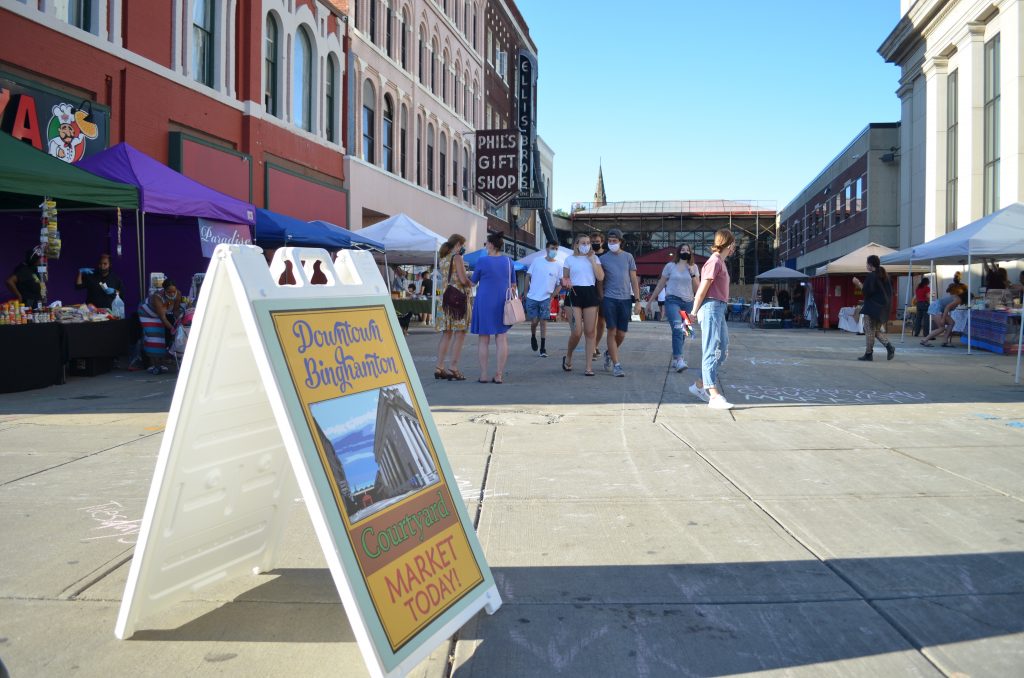Every Tuesday evening, shoppers touting reusable grocery bags fill the Metrocenter at the intersection of Court Street and Washington Street for the Binghamton Downtown Courtyard Market. This seasonal market running from July 7 through Oct. 6 features organically and locally grown produce, meats, handcrafted goods and more.
This year is Downtown Courtyard Market’s second year in the Metrocenter. According to 24-year-old market manager Eliana Epstein, ‘20, a Binghamton resident, the number of vendors has grown from four to 20 over the past year. The Downtown Courtyard Market aims to bring the community together by supporting local businesses and showcasing Binghamton’s variety of vendors, farmers and small businesses.
“We are trying to increase food accessibility to Downtown Binghamton and increase vendor diversity within farmers markets and provide a safe space for community members to support local businesses and buy local produce,” Epstein said.
Epstein recognizes the lack of diversity in background as well as lack in variety many farmers markets suffer from and hopes that the Downtown Courtyard Market can change that.
“Diversity of vendor choices and also the type of people that are present here were really important to us,” Epstein said. “Almost every single time I go to a farmers market almost every single vendor is white, and all of the farmers are pretty much men and I wanted to change that up. I’m really thankful for the ‘Support Black Businesses 607’ webpage that linked me up with a lot of awesome vendors we have here.”
One of the most well-known vendors at the Downtown Courtyard Market is Triple J Farm. Recently featured on the local radio station WSKG-FM and nationally on NPR, the poultry farm produces and delivers 200 dozen eggs per week in Binghamton and New York City. Jarrad Nwameme, the 32-year-old CEO at Triple J Farm, talked about the elaborate history behind the Black-owned business.
“Our stand is pretty simple: we’re a Black-owned farm, in Windsor NY,” he said. “The farm was started by my grandfather 12 years ago.”
Nwameme’s 85-year-old grandfather, James Minton, resides in Windsor, but originally grew up in Georgetown, South Carolina. The inspiration to own a farm came from Minton’s childhood memories of playing on the same plantation his uncle and aunt once worked on. Nwameme reflected on the setbacks that his family — and Black farmers as a whole — have faced in running multigenerational businesses.
“Black farmers in America is a challenge in itself,” Nwameme said. “Getting land [for Black Americans] is a challenge in itself. Growing and scaling — that’s our biggest challenge right now. We’ve been working for 400 years, not literally but figuratively, and trying to get what we’re doing right now.”
The vendors reflect a wide range of experiences and backgrounds. Marshall McMurray, 59, of Endicott, recently opened Bernice’s Brew, a Black-owned coffee shop in Endicott, and tabled at the Downtown Courtyard Market for the first time on Aug. 25.
“When I retired from the corporate world, I needed something to do. So I decided to open a coffee shop,” McMurray said.
Meanwhile, Jeffrey Thacher, of Binghamton, has been a professional cook for ten years working at Garage Taco Bar and recently began selling desserts at the Downtown Courtyard Market as co-owner of Babushka Eats.
“I work at Garage Taco Bar and I was baking some stuff two years ago for Valentine’s Day,” Thacher said. “I did a vegan cheesecake and partnered with Parlor City Vegan for that … The year after, we did it again and we partnered with them again. Everyone loved everything so much that my boss pushed me to do my own thing.”
Epstein said the market works to secure food accessibility for Binghamton residents.
“A really big goal of mine is to raise food accessibility here, because Binghamton is in a food apartheid and we want to be helping the best we can,” Epstein said. “There are no supermarkets around the Downtown [Binghamton] area, and in order to buy fresh produce you need to have a car or take the bus.”
Epstein emphasized the importance of community bonding and support during unprecedented times.
“….While we’re in a pandemic it’s hard to feel a sense of community and pride in your city so having that central sense of pride and a safe not gathering point but a place for people to be together and a place for local small businesses to get their name out there,” she said.
Nwameme echoed Epstein’s sentiments by highlighting the connection between the producer and the consumer, as well as the close relationships that are formed through the market.
“Food comes from the earth, and the fact that you’re getting it from farm to table, it’s great,” he said. “You know where it’s coming from, you see the people, you’re talking to the people [who produce it], it gives [customers] more confidence in the food that we’re eating. Especially nowadays with everything going on when it comes to the coronavirus.”



